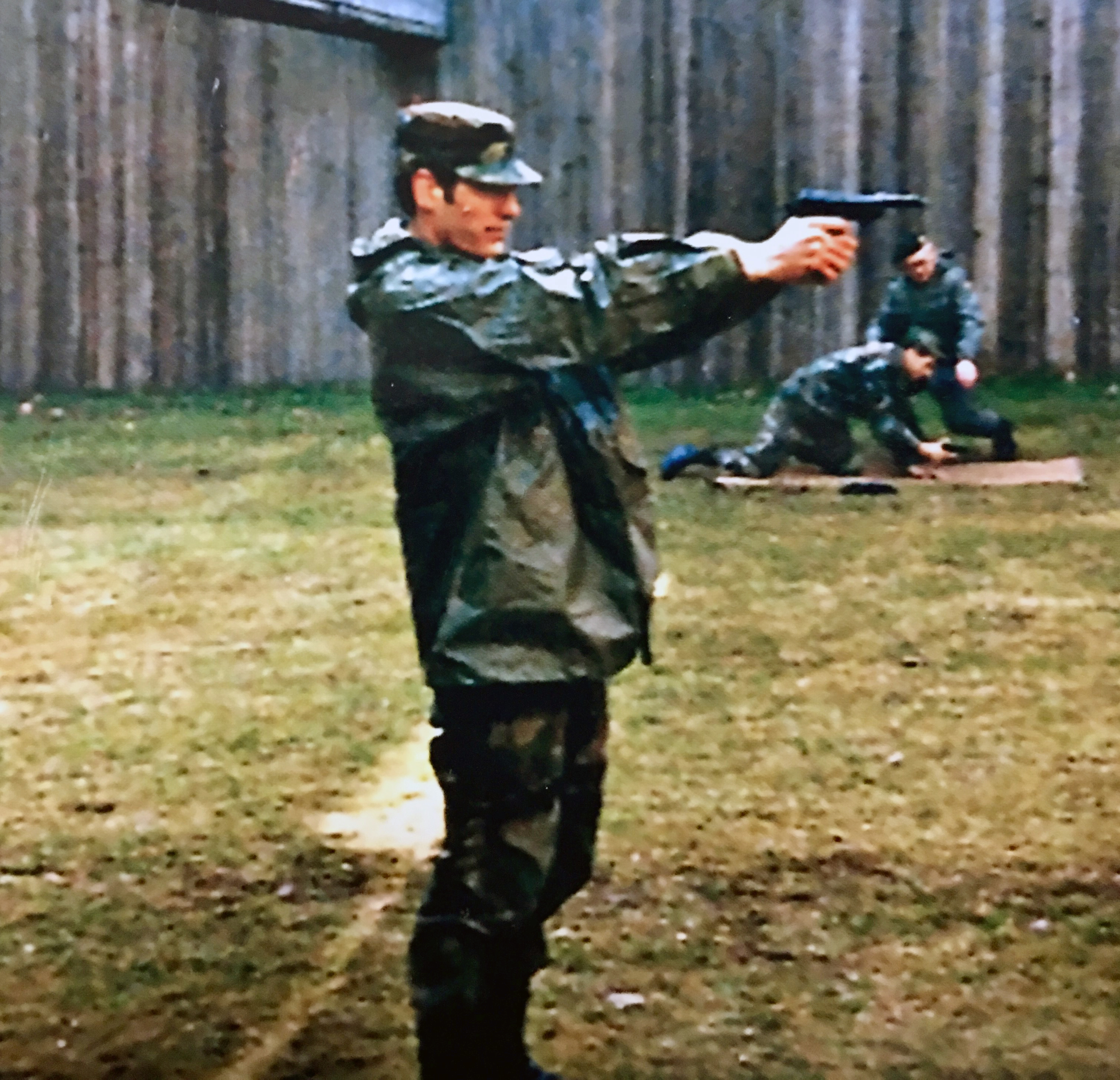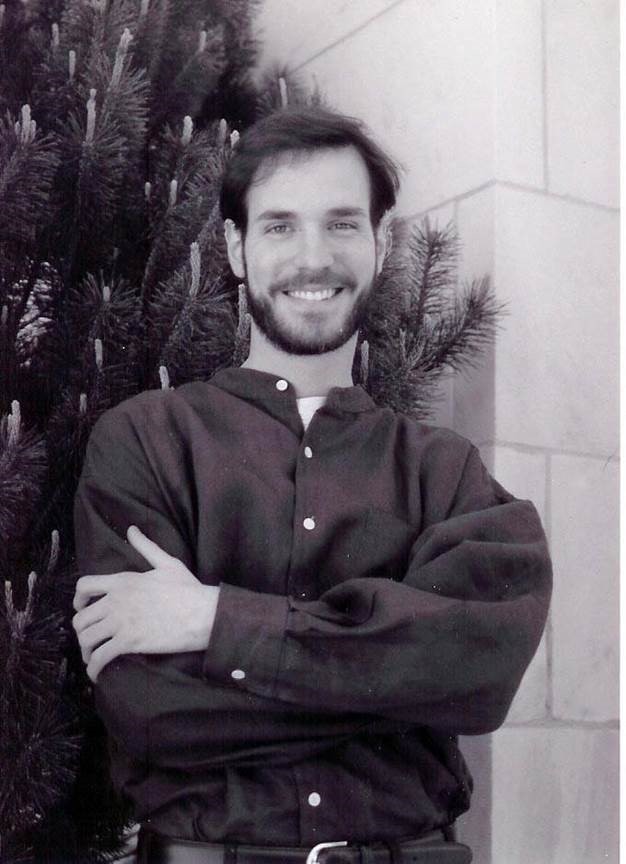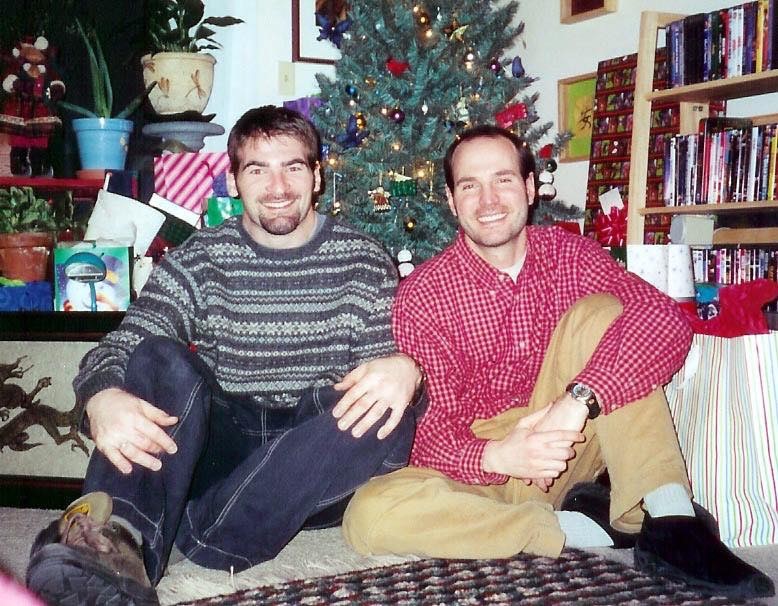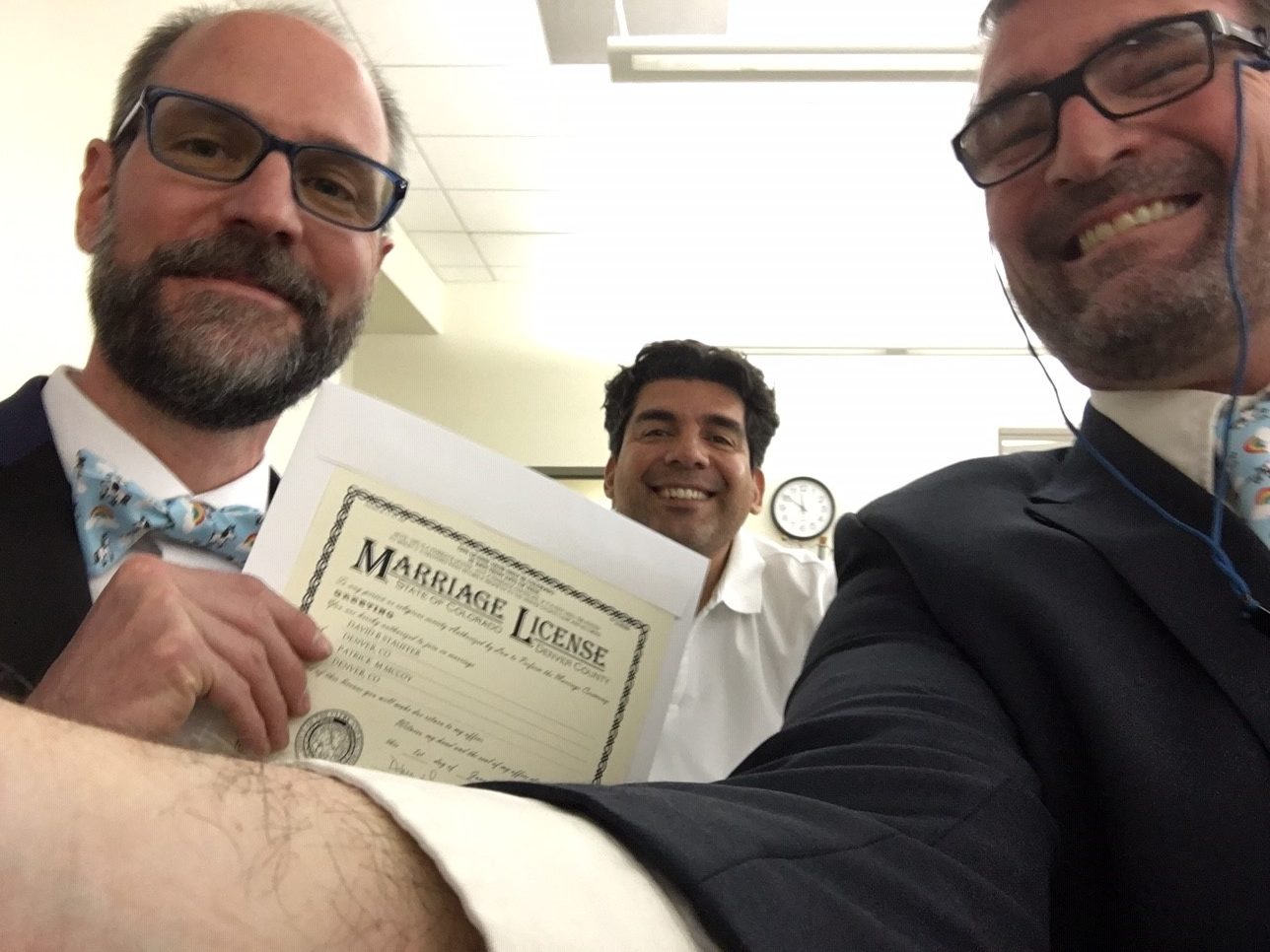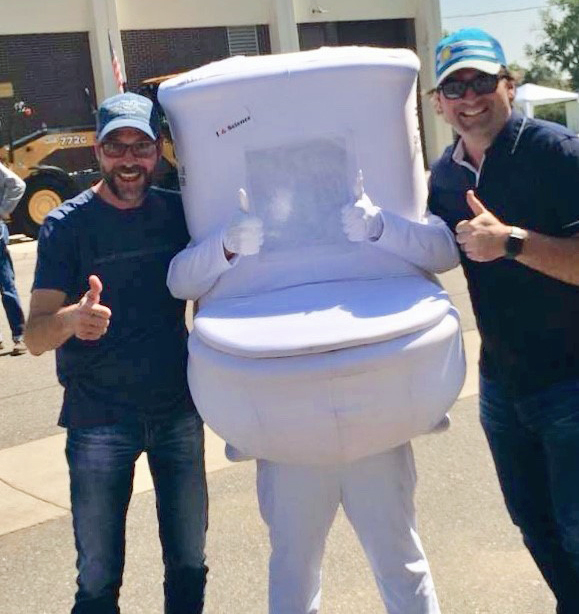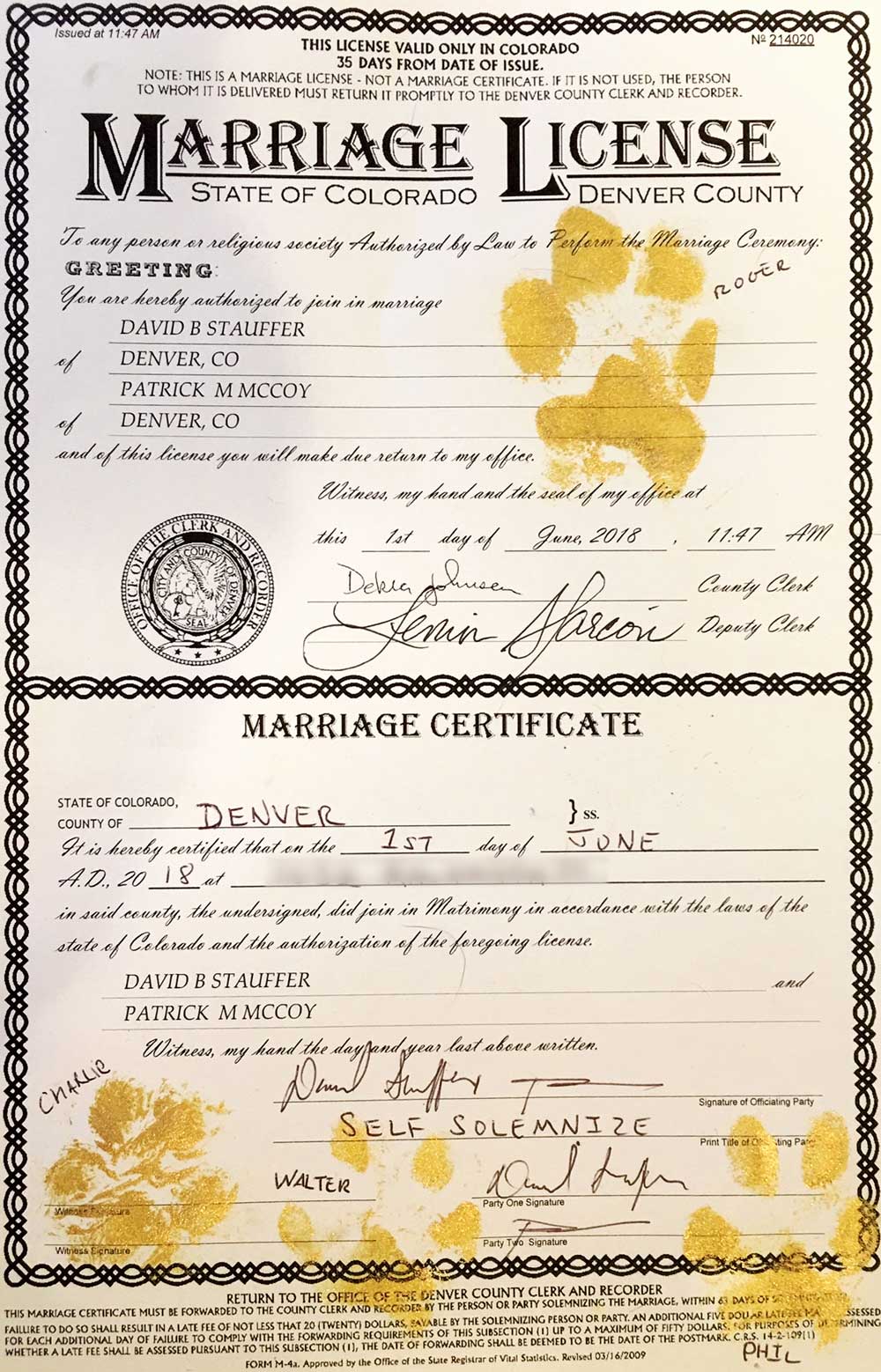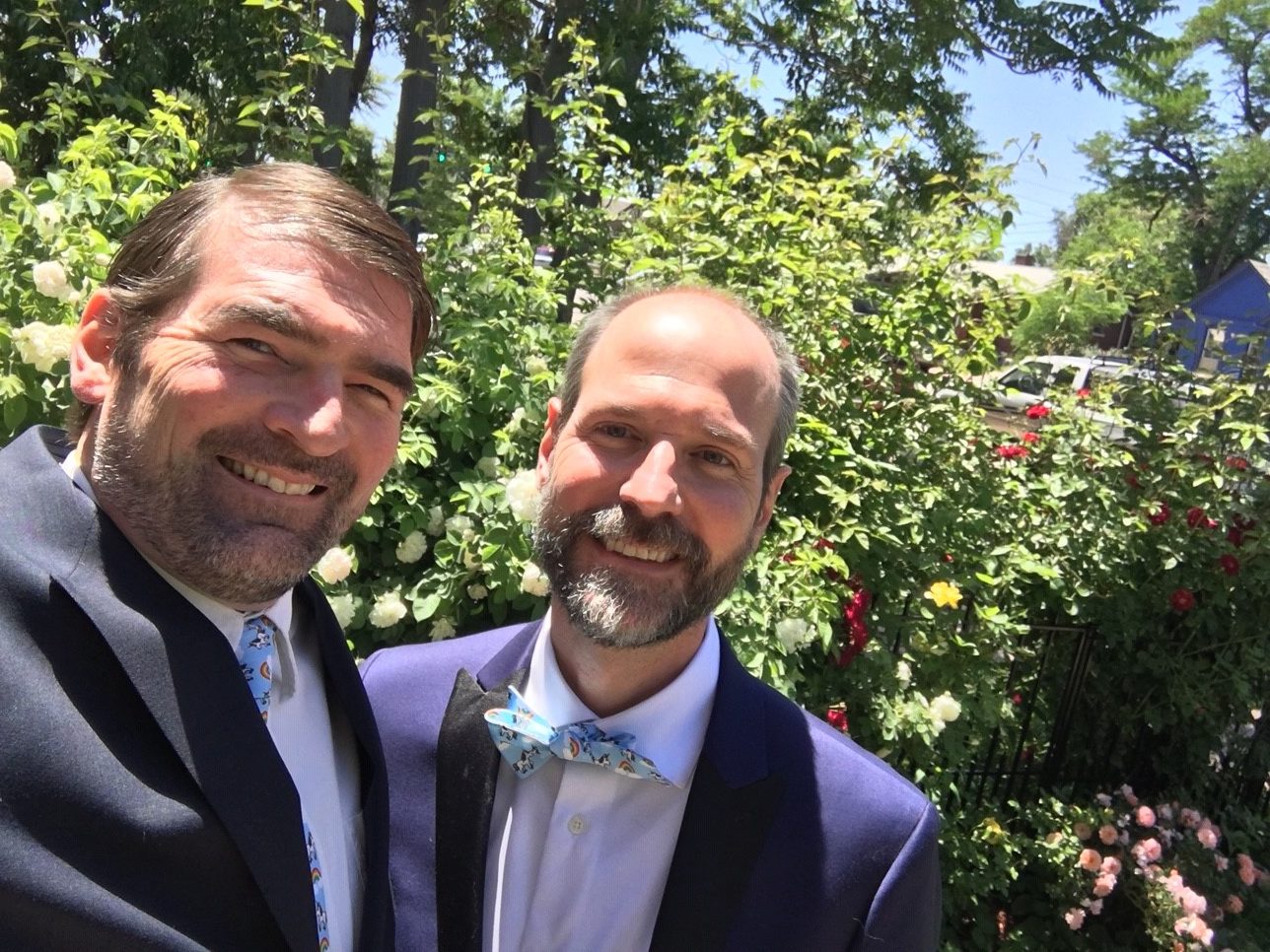
Pride Month: In his own words
Denver Water is proud of its diverse workforce. June is known as Pride Month for the LGBTQ+ communities in honor of the 1969 Stonewall Uprising in Manhattan, considered a crucial event in the LGBTQ+ rights movement. In honor of Pride Month, we're sharing the story of Patrick McCoy, a member of Denver Water's IT division. Read it, and go here, here and here for more stories about some of the other members of our diverse team who ensure the delivery of clean, safe water to 1.5 million people.
Patrick McCoy was 14 when his mother left, abandoning him and his twin brother.
His brother left to live with his father, and McCoy — homeless as a high school freshman — spent the next four years crashing with friends or sleeping in cars.
Determined to graduate from high school, he kept quiet about his homelife, afraid he’d be kicked out of school and put in foster care if anyone found out the truth.
It was the first of many times McCoy’s life was marked by fear of being found out and the loss that would follow if the truth became known. As a teenager, he hid the fact he was homeless. As a member of the U.S. military in the 1980s and 90s, he hid the fact he was gay.
Then a stolen letter about a kiss triggered an arrest by military police, a night in jail, the yanking of McCoy’s top-secret clearance, and an honorable discharge from the U.S. Air Force for being an admitted homosexual. He was released onto the streets with the clothes on his back, homeless again and facing more years of verbal and physical abuse, discrimination and fear.
But McCoy’s life also is marked by a faith that things would get better. And today he’s proud of who he is and the happiness he’s found.
"This is the first time I've ever felt safe enough to share my story," said McCoy, who joined Denver Water in 2012 and works as an IT change manager.
"Denver Water has given me that."
Today, McCoy is happily married to a man he met in 2001. He has a successful career. He’s an active advocate for Denver’s LGBT community and for military veterans. But the scars, although buried, remain.
McCoy worries about how people will react if they learn he’s gay.
“The fear and hesitation are still very real for me. I’m often afraid to reveal who I am to strangers. I don’t think that fear will ever go away,” he said.
“The strength to keep going, that comes from within myself. I try to stay true to myself and not be afraid of who I am — to stand up for what I believe in and be good to others. You never really know what’s going on in someone’s life.”
Creating a family, and a cover
McCoy was a senior in high school when he told his friends he was gay.
“I dated girls in high school and all of my closest friends were females,” he said.
“It wasn’t until I got older that I realized I surrounded myself with women because they made me feel loved and supported. They were my family.”
His own family gone, McCoy confided in his new family, his girlfriends.
“I was so afraid they would think I was broken. It’s thanks to my supportive group of girlfriends that I was able to find myself. They showed me that I wasn’t broken, that there wasn’t anything wrong with me,” he said.
McCoy graduated fourth in his class of more than 400 students.
On his own after high school, he joined the Air Force, but hid his homosexuality out of fear of how his military comrades would react if they discovered the truth.
He soon learned he was right to be cautious.
During basic training, McCoy’s squadron began harassing another airman they suspected was gay. One night, they beat him so severely he had to go home.
McCoy knew he could never reveal he was gay.
“I was so afraid people would find out. I knew they would hurt me. I had to hide who I was. Every single day I lived in fear that someone would learn the truth,” he said.
McCoy set about building a cover designed to ensure his secret was safe.
He instigated a fight with the largest, toughest man in the squadron.
“I hoped someone would break up the fight before the other guy really hurt me,” he said. “I wanted people to think I was crazy — that surely a gay boy wouldn’t be tough like that.”
His lack of family helped build his cover.
“I was the only one who never once received mail,” he said. “This actually worked to my advantage, helping to solidify my crazy, tough-guy persona.”
But McCoy knew he was destined for greater things. When things got hard or when he got down, he referred to a list he wrote when he was 14 years old.
“I listed all of the qualities I thought made someone great, like compassion, love, kindness, perseverance and education. I knew I was smart, and I knew I had a lot of good qualities. This is what kept me going,” he said.
Rising through the ranks
After basic training, McCoy was sent to Biloxi, Mississippi, for technical school. Thanks to his exceptional grades, McCoy became the squadron leader — a role he maintained his entire three months of training.
“This was another way I could distract people from who I actually was. I was a leader and I worked hard to make sure everyone liked me. I figured if they found out my secret, maybe they wouldn’t hurt me if they all liked me,” he said.
After technical school, McCoy was given a month of leave before heading to his assignment in Germany.
During that month, McCoy met and befriended Jenny, an 18-year-old girl he’d met in Virginia who’d fallen on hard times. They decided to get married.
“We were good friends and we needed each other more than we realized,” said McCoy. “I was so afraid to live in the dorms in Germany and have my secret revealed. If I were married, people would never guess I was gay, and we could live in married housing.”
The two traveled across the state line to North Carolina. They pooled their money, using rolls of coins to pay the marriage fees. McCoy placed a Thundercat decoder ring he got from a box of Cheerios on Jenny’s finger. They were married.
The newlyweds moved to Germany where McCoy had a top-secret clearance and collected intelligence using aerial imagery.
During his time oversees, McCoy was deployed to Kuwait and Saudi Arabia. He stood shoulder to shoulder with others holding a hammer when the Berlin Wall was torn down.
“The hours were long, and the work was tough, but I was great at my job. I was a good soldier,” said McCoy.
A kiss, a letter and more loss
After three years in Germany, Jenny got involved with drugs and began hanging out with the wrong crowd. The military forced McCoy to send her back to the United States.
“She was able to get out of the environment she was in and get sober. I sent money to her so she could attend college,” said McCoy. “In hindsight, it ended up being a good thing.”
The two would stay married for 23 years, although they only saw each other once again, when McCoy visited her in college.
Nearing the end of his four-year deployment, McCoy went out one night and met a man. They kissed.
It was the first man McCoy had ever kissed. He wrote about the experience in a letter to Jenny, his longtime confidant. He sealed the letter and stored it in his locker until he could get to the post office.
He wouldn’t get the chance to mail it.
Another service member discovered the letter. She opened it, then shared it with the rest of the squadron.
McCoy was immediately arrested for being an admitted homosexual and spent the night in jail.
“The experience was absolutely demeaning. Once the officers found out I was gay, they wouldn’t look at me — not a single one would look me in the eyes, not even my lawyer,” he said.
McCoy protested, saying his privacy rights were violated when the letter was stolen from his locker.
“My lawyer told me that once they found out ‘what I was,’ I lost all my rights.”
McCoy was ordered to attend weekly sessions at a mental institution, and his top-secret clearance was stripped from him.
Unable to perform his job without a clearance, McCoy was forced to move mattresses in and out of the dormitories for a month. He was then given a job working in a call center with the dependent wives of other soldiers.
“They did everything they could to take away every bit of pride I had. I was a soldier and I was really good at my job. They took that all away from me. It hurt,” said McCoy.
On Dec. 21, 1993, President Bill Clinton issued a directive to the military that would become known as "don't ask, don't tell." It was intended to be a compromise from the military’s prior stance that gay servicemen and women were barred from serving. The new directive said the military couldn’t ask servicemembers about their sexual orientation, nor could servicemembers disclose their sexual orientations.
But McCoy’s secret was already out. And 11 days after the directive was issued, McCoy was sent home.
“I was told if I remained quiet about everything they did to me over the previous year, they would give me an honorable discharge,” he said. “That was very important to me, so I didn’t say a word.”
It’s estimated that about 17,000 men and women were discharged from the military under the “don’t ask, don’t tell” policy between 1993 and when it was ended in 2011, following legislation by Congress in 2010 and President Barack Obama’s signature.
McCoy was granted an honorable discharge. His official paperwork lists the reason for discharge as “homosexual,” which at the time meant he couldn’t receive any military benefits.
Homeless and afraid, again
After five years away from the U.S., McCoy was dropped off at an out-processing center in Philadelphia with nothing more than the clothes on his back.
He was homeless once again.
“I had a friend in Germany who was always talking about how great Denver was, so I set my sights on Colorado,” said McCoy.
He started hitchhiking and hoped into a car with a man heading west.
Then the driver started talking.
“He began making derogatory comments and spewing racial slurs about all kinds of people, including gay people,” said McCoy.
“I had no doubt that if I told him I was gay he would leave me dead on the side of the road.”
In Indianapolis, McCoy got out of the car, shaken.
“I was thinking, ‘Is this what I went to war for? Is this the America I risked my life for?’”
Looking for support and understanding, he went to a gay bar, but didn’t find what he was looking for.
“I was shocked at how little they cared,” said McCoy. “They didn’t really care what I had been through. Everyone just wanted to party and have fun. I felt like I got more support from my heterosexual friends than from anyone in the gay community there.”
That was the moment that changed things for McCoy. It was then that he decided he needed to get involved, to be an activist, to make a difference.
But first, he wanted out of Indianapolis.
McCoy worked several jobs, waiting tables, working at a video store and at a tax center. He lost count of the jobs he was fired from when someone discovered he was gay.
But he saved his money, bought a beat-up old car and headed west again.
Marching forward with pride
“Once I got to Denver, I became actively involved with gay pride,” said McCoy.
It was 1994, and that November would be the first Veterans Day celebrations following the official repeal of the “Don’t Ask, Don’t Tell” policy.
For Denver’s parade, McCoy gathered three other gay veterans. The four of them marched in the parade.
Two held a sign that read “Gay Veterans.” The other two held American flags.
“We were vulnerable and terrified, but we refused to allow anyone to say we weren’t veterans. We were proud of our military service, and we were proud to be gay,” McCoy recalled.
As the four marched down the street, McCoy looked up into the crowd. He saw a mother with her young daughter. And he saw her read their sign.
“She reached down and clasped her daughter’s tiny hands and clapped them together for us,” McCoy said. “Thinking of that moment still brings tears to my eyes.”
After that first parade, McCoy began advertising and organizing people in the gay community. They began marching in gay pride parades and started building support systems and spreading the word about gay pride.
“For the first time, I found myself surrounded by people who were just like me. We had all experienced so much pain. We’d all had careers taken from us, had been victims of violence, had felt afraid to reveal ourselves. Many of us had had our whole lives changed and had to start over,” he said.
With renewed purpose, McCoy found out he did have military benefits, and enrolled in school with help from the GI Bill, which offers financial help to veterans pursuing an education. He got a bachelor’s degree and eventually a master’s degree in computer science.
“With each step I made in my education, I was able to get better jobs with bigger companies, and was able to grow my network,” he said. “I was able to bring together groups of veterans and I started seeing changes.”
He was proud of the changes he was seeing, but also facing new challenges as an openly gay man.
McCoy faced incidents of verbal and even physical assault in the workplace, forcing him to leave jobs.
“I found an IT job working nights by myself so no one would notice me and where I didn’t have to be afraid of what might happen to me,” he said.
On June 1, 2001, he met a man named Dave and his whole world changed.
Dave had just come out to his family when he met McCoy.
Since they met, the two have never been apart, even though McCoy’s marriage to Jenny was still on the books.
“When we met, I was still married to Jenny. We just never saw any need to go through all the legalities of divorce. I certainly wasn’t going to get married since I was gay,” said McCoy.
On Oct. 7, 2014, same-sex marriage became legal in Colorado. That spurred McCoy to start the necessary paperwork to divorce Jenny.
A year ago, on June 1, 2018, exactly 17 years after they met, Dave and McCoy were married in a private ceremony, stamping their marriage license with their dogs’ footprints as witnesses.
It has been a long, painful journey, one that will continue.
But McCoy’s optimistic about the future.
“I see the new generation leading the way, showing pride in who they are, and I see how they continue to shape the gay community. It gives me hope,” said McCoy.
“After all, I lived in a car and look at me now.”


